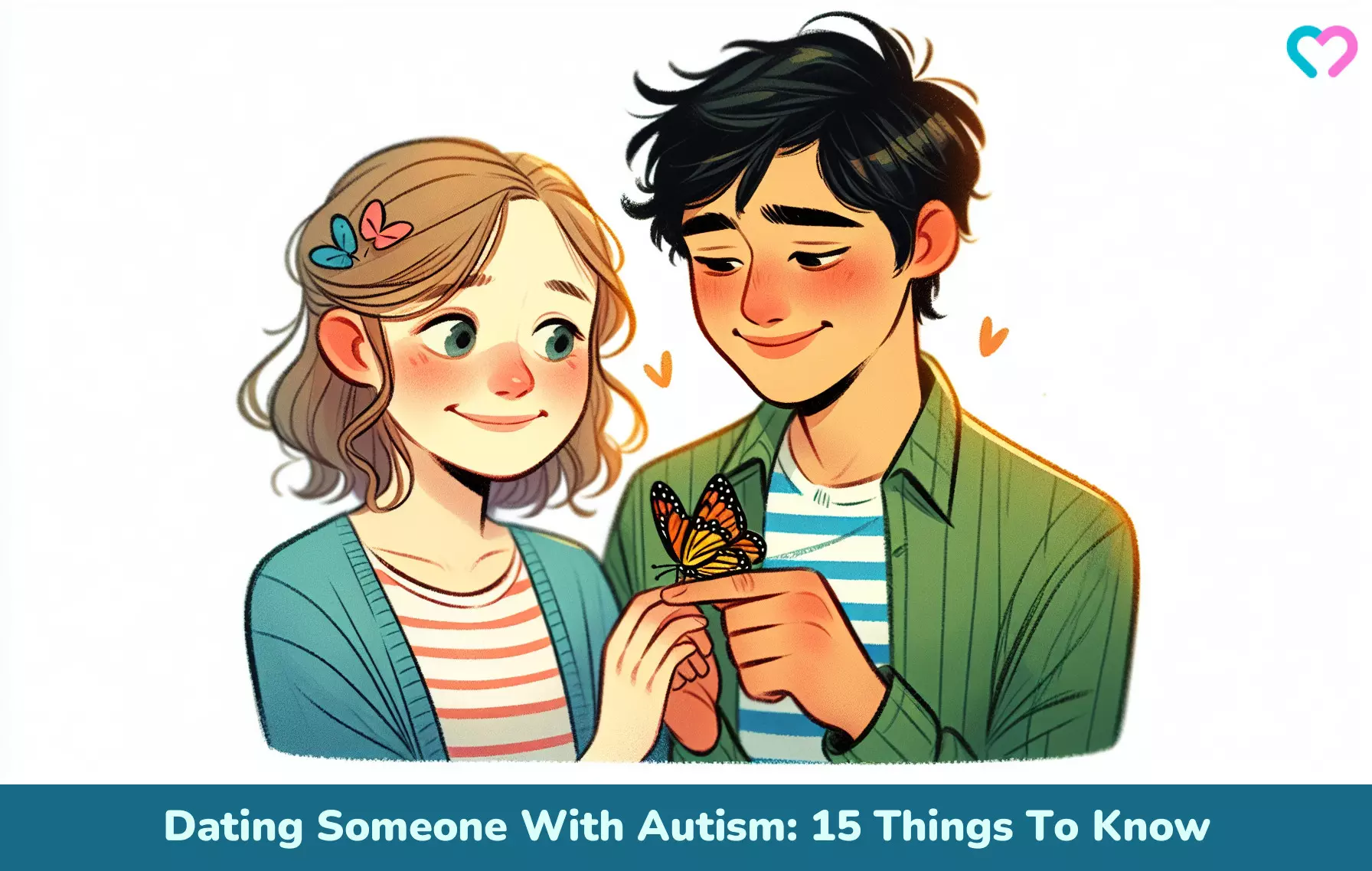
Image: iStock
Navigating the dating scene is challenging in itself, and dating someone with autism can be a new experience for you. However, it is no less great an experience than dating a regular person. Autism spectrum disorder is a neurological condition that affects a person’s perceptioniOrganization, identification, and inferring sensory information , learning, and ability to socialize and communicate (socialization skills). A person with autism may have difficulty being articulateiThe ability to express oneself clearly in speech or writing and indulge in repetitive behavioral patternsiAbnormal behavior characterized by repetition and rigidity . Different people with this condition can manifest different symptoms, and the intensity may vary in each case (1).

If you plan to or are already dating someone diagnosed with autism, this post might come in handy. Read on as we explore the various challenges and amazing aspects of dating someone with autism.
Key Pointers
- If your partner has autism, you must know that subtle romantic hints might confuse them.
- They may not like to be touched, so be patient and find other ways to express your love.
- You should be direct and honest with your words and behaviors while being with them.
Is It Hard To Date Someone With Autism?
Dating someone with autism is different and challenging, but it can also be a fulfilling experience if you know how to get along. Before you start dating a person with autism, you should know that they may not be equipped to understand or decode certain things in life like a neurotypical person, so you need to treat them with kindness and patience. They may also find it hard to recognize specific body language or expressions. Additionally, someone on the autism spectrum may perceive and process communication differently.
Romantic relationships can be confusing for a person on the spectrum. They want to be loved, just like a neurotypical person, but have fewer opportunities to meet potential new partners and greater anxiety when initiating a relationship (2). Also, they may fail to understand subtle romantic hints by their partner, which can be frustrating for both of them. Straightforward and candid communication is helpful and critical for the success of the relationship. They have their share of struggles and need a partner who can understand their style of communication, their behavioral quirks, preferences, annoyances and support them.
To make a relationship work with a person who is on the spectrum, you need to be extremely patient, emphatic, respectful, and understanding. You also have to be clear with what you want to communicate to them and not expect them to understand cues and hints on their own. Italy-based life coach Rodolfo Parlati advises, “Take a moment to be patient and open-minded, as people with autism often have unique ways of communicating and expressing their feelings. It’s beneficial to understand their specific needs, preferences, and any sensory sensitivities they might have to foster a comfortable and supportive environment.”
Dating Someone With Autism: 15 Things To Know
Dating someone with the autism spectrum may not be easy. That is why you need to know a few things before you start a relationship.
1. They are not emotionless
A person with autism finds it difficult to express their emotions and feelings clearly, and hence, is often perceived as being cold, uncaring, or even emotionless, which is not true.
They are emotionally sensitive and sometimes experience emotions more strongly and deeply than neurotypical peopleiPeople whose brain functions according to their age (3). However, they cannot express the same easily as most people. You need to understand this and not wrongly assume them to be completely indifferent to your emotions.
Blogger K. Thor Jensen shares how he feels about his wife’s emotions as a person with autism. He writes “Processing emotions is similarly tough. I understand when people are sad or angry. But it’s often hard for me to mirror those emotions when it’s appropriate. My wife will be upset about something, and I’ll feel bad for her, but my primary impulse is to try and find a solution to the problem when she just wants someone to be mad with. This can, naturally, feel a little frustrating for her (i).”
 Do remember
Do remember2. They may not appreciate a physical touch

Sometimes, a person with autism may experience sensitivity to touch and may feel enraged to even a slight brush of fingers, while some love to be hugged tightly (4). This varies for those on the spectrum. You need to discuss this clearly with your partner to understand how they like to be touched. If they are averse to being touched, find an alternative way to express your love for them.
Here is what Cassie Hauschildt has to say about experiencing physical touch as a neurodivergent individual. She writes “After the puppy love wore off, I became averse to physical touch. Having two children touching me all day has made it worse. This has required a huge but necessary adjustment for my husband. We have overcome this by strengthening other areas of our relationship, such as quality time together. We try to have one to two hours together after the kids go to bed every night, before we go to sleep, where we just enjoy the same game or TV show together while not touching (ii).”
3. They like to follow their routine
Individuals on the spectrum exhibit repetitive behavior and activities. It can cause a certain obsessiveness for their routine. Due to any reason, if they are unable to follow their routine, it can cause them a lot of anxiety, leading to tantrums (5 ). They might find impromptu dates or surprises stressful and not appreciate them. Acceptance of their routine is crucial so you can plan a date that fits in their schedule and does not disturb it in any way.
4. They take their time to adjust
Since they are so accustomed to a routine, stability and familiarity are important to them. They find changing their habits and adjusting to anything new challenging (6). For instance, if you move to a new house or start living together, the experience can be overwhelming for them.
Katie Kustron, an entrepreneur, emphasizes the importance of understanding the accumulation of experiences that lead to a meltdown for a person with autism. Describing the challenges her fiancé faces due to autism, she says, “If my fiancé is in a new place, let’s say a restaurant, they are surrounded by so much newness. There are new smells with all the food around, new booths to sit on, new waitresses and waiters serving us, new menu, new food that she has to try, etc. All of those things that I just listed will build up in her, and sometimes it will lead to a meltdown (iii).”
So, you need to introduce changes or interventions to them slowly and gradually. Give them time to adjust and ease into a new routine; do not rush into anything.
5. They cannot go on regular dates

Going to a bar sounds like a good idea for a date. But given their heightened sensory perceptions, going to the bar may be the most uncomfortable experience for someone on the spectrum. A person with autism can be sensitive to noise, smells, flashing lights, and crowds (7). If your partner is hypersensitiveiA condition where sounds seem much louder than they should to sounds, plan your date according to their comfort level and preferences. Finding a location or activity that they like can make the bonding experience comfortable and enjoyable for them.
6. They seem to be a selfish talker
Topics of discussion with a partner with autism may often involve their subject of interest. When they have a hobby or interest they are passionate about, they can talk on and on about it. They will show hardly any interest in anything else, which might make them seem self-centered, but this is just their way of coping with everyday life (8). You need to talk to them about it patiently, and with practice, they can become a better listener and learn to listen to what others have to say and understand their perspective.
7. They need you to support their interest
People on the spectrum can be highly passionate about their interests. Their interests and hobbies may be unusual for you, but those mean a lot to them. Support their interests. Try to see the world through their eyes. If possible, and if they are okay with it, join them. Let them spend some time indulging in or pursuing their interests. Do not mock anything dear to them as they may resent you for it.
 Point to consider
Point to consider8. They do not get sarcasm
People on the spectrum think literally. Therefore, they might not understand idioms, slang, or sarcasm (9). So, if you get angry and ask them not to talk, they might stop talking to you. Hence, you need to be careful about what you ask your partner to do and what you tell them because they will believe everything you say and even follow your instructions. The importance of being clear and direct can’t be emphasized enough.
9. They cannot be diplomatic

Ask your partner how you look in an outfit and be ready for an honest opinion. This is one characteristic of people with autism. They lack tact and speak nothing but the blunt truth—they can not be diplomatic. They tell what they feel is right. They are not deceptive in any way, which makes them trustworthy. However, you need to develop a thick skin if you want their opinion on anything.
10. They may seem unpredictable sometimes
Impulse control and emotional regulation can be a challenge for a person on the spectrum. Suppose you and your partner are watching a movie at home, and suddenly they switch off the movie because they spot a butterfly in the background and are afraid of butterflies. You have to be mindful of the triggers that disturb your partner. Even after taking care of the slip-ups, your partner throws a tantrum, be patient with them instead of reacting and getting frustrated. These fears or reasons might seem silly to you, but it is important to be empathetic towards their feelings while treating them like adults.
 Quick tip
Quick tip11. They prefer your consistent behavior
Keep your communication consistent and predictable. When you tell your partner something, stick to it because when you keep changing your mind, it can overwhelm and confuse them and cause unnecessary frustration. For instance, if you tell them you want to eat a doughnut, and just when they are about to order the same, you change your mind, it could frustrate them.
12. They want you to be direct and honest

For those on the spectrum, relationships can sometimes cause anxiety. To avoid unnecessary stress for your partner, be direct and honest in your approach. They also want to make the relationship work as much as you do. They only need you to be explicit with what you want and communicate the same to them without hesitation.
13. They may not understand your unspoken words
You may be upset about something and may need your partner to comfort you. However, do not expect them to sense your low mood on their own. Some people on the spectrum are unable to identify and understand the feelings of others (10). It is not that they lack empathy. They cannot figure out social cues easily. So, next time they fail to comfort you, do not feel bad about it. They cannot figure out social cues easily and may need a little guidance. So, do not feel bad about it next time they fail to comfort you.
 Point to consider
Point to consider14. They do not mind your questions
No matter how long you have known your partner, there will be times when you will feel that you do not understand them. Instead of feeling frustrated, ask relevant and genuine questions to your partner. Ask them directly what they expect from you and do as they say. And when they ask you any questions, answer them honestly and seriously. Do not treat them like children; keep your communication crisp, clear, and open.
15. They need you to have their back

Not everyone understands the special needs of a person with autism. There will be instances when they might have difficulty in social situations and when interacting with people other than their family. In such situations, they will need you to help others understand them. You will have to act as an intermediary to resolve conflicts on their behalf.
Positive Aspects Of A Partner With Autism
Dating someone with autism presents unique challenges, but it also offers many rewarding aspects that can have a positive impact on a relationship. Recognizing these positive traits and how they shape the relationship can increase the appreciation you have for your partner. Here are some positive aspects of being with a partner who has autism (11) (12).
- People with autism are often honest and say what’s on their minds. So, you would not have to keep second-guessing what they meant to say.
- They have keen observational skills, are analytical problem solvers, and can focus on issues that interest them, qualities which can make them excellent partners.
- As people with autism are known to have distinctive imaginations, unique thought processes, and methodical approaches, your date nights will be anything but boring.
- People with autism tend to be loyal and accepting of differences. Therefore, you can build a genuine connection that grows stronger with time.
How To Make A Neuro-Blended Relationship Work?
Every relationship has its ups and downs and requires patience and communication. However, if you are in a neuro-blended relationship, where one of you is on the autism spectrum, you may need to take some extra steps to ensure the bond remains strong. Here are some expert-approved tips on how to make your neurodiverse relationship thrive (13) (14) (15).
- Build trust and have an intimate understanding of each other. Share beliefs, emotions, desires, and goals and offer affection and support.
- Recognize that your partner with autism may have a hard time asking for clarification and/or even knowing that clarification is needed.
- Communicate clearly with concise directions or choices. Avoid idioms or slang when speaking with your neurodivergent partner.
- Learn about each other’s interests and favorite hobbies and games. Also, state your social, emotional, mental, physical, and sexual needs explicitly.
- Address the sensory sensitivities of your neurodivergent partner. Consider having sensory friendly meeting areas with dimmed lights, comfy chairs, and limited distractions.
- Don’t react to a lack of eye contact, motor tics, or boundary issues. Spend leisure time together and schedule time for individual interests if certain activities overwhelm your neurodivergent partner.
- Avoid text-based communication, as it can be challenging for the neurodivergent partner to decode.
- Consult a professional with experience working with adults on the autism spectrum.
Frequently Asked Questions
1. How should people with autism flirt?
You should be honest, smile often to show your interest, talk casually to the person you are interested in, don’t have a lot of expectations, and move on if the other person is not interested in you.
2. How can I help my partner with autism build confidence and self-esteem?
Encourage your partner to indulge in self-care activities like yoga and meditation. Help them identify their talents and abilities. Communicate openly and empathetically, giving them ample space to express themselves. Most importantly, work with your partner to set achievable goals that align with their interests and abilities. Also, celebrate each milestone achieved, reinforcing their sense of accomplishment to boost their confidence and self-esteem.
3. How do autistic people show their love?
People with autism share their love in unique ways. They express their emotions and feelings genuinely. When deeply interested in someone, they may show their love by giving that person their undivided attention. They might engage in intense conversations or activities for couples that they and their partner like. To go the extra mile, they may share chores and tasks to display their love, care, and support.
4. What are some effective communication strategies for dating someone with autism?
You may adopt any communication strategy when dating someone with autism as long as it encourages clear, direct language with no reliance on hints and gestures often used in romantic relationships. Relationship counselor Isiah McKimmie suggests, “Just like in any relationship, you’ll need to talk to them about what their triggers are and what their needs are.” Avoid indirect references and be direct with communicating your feelings. If you feel something, use the exact words to describe it rather than being coy. Be patient and give your date adequate time to respond to what you share.
If you have fallen for and are considering dating someone with autism, make sure to give the above points a good read to know what to expect. People with autism are different and perceive life differently. Hence their behavior, ways of expression, and overall style of living can be challenging to understand at first. But when you get to know the person, you can find a different meaning and view of life. So be patient, understanding, and take things slow. You may take the help of a specialist to help make dating a person with autism easier and a happier experience.
Infographic: Things To Know About Dating Someone With Autism
Dating someone with autism can be a fun and loving experience if you know how to navigate it. You need to be more understanding in this relationship to help your date open up and be comfortable. So here are the essential things you must know and consider when dating someone with autism.
Some thing wrong with infographic shortcode. please verify shortcode syntax
Illustration: Dating Someone With Autism: 15 Things To Know

Image: Dall·E/MomJunction Design Team
Dating someone with autism can be a rewarding experience. It is important to be patient, understanding and respectful. This video unfurls some important things to keep in mind while dating someone with Autism.
Personal Experience: Source
MomJunction articles include first-hand experiences to provide you with better insights through real-life narratives. Here are the sources of personal accounts referenced in this article.
i. How To Be A Loving Partner When You’re On The Autism Spectrumhttps://medium.com/dose/how-to-be-a-loving-partner-when-youre-on-the-autism-spectrum-7bdc1ae7c3fe
ii. Autism and marriage
https://www.autismspeaks.org/blog/autism-and-marriage
iii. 5 things you should know about dating on the spectrum;
https://medium.com/hello-love/5-things-you-should-know-about-dating-on-the-spectrum-a0bceaa8190c
References
- What is autism?
https://www.autismspeaks.org/what-autism - Autism and dating – what the research tells us – by Emma Gallagher
https://www.aspect.org.au/blog/autism-and-dating-what-the-research-tells-us - Taking care of mental health is important for overall well-being.
https://aane.org/autism-info-faqs/mental-health-wellbeing/ - How ‘social touch’ shapes autism traits
https://www.thetransmitter.org/spectrum/social-touch-shapes-autism-traits/?fspec=1 - Why is Routine so Important to People with ASD?
https://www.appliedbehavioranalysisedu.org/why-is-routine-so-important-to-people-with-asd/ - Dealing with change
https://www.autism.org.uk/advice-and-guidance/topics/behaviour/dealing-with-change/all-audiences - Sensory Issues
https://www.autismspeaks.org/sensory-issues - Obsessions and repetitive behaviour
https://www.autism.org.uk/advice-and-guidance/topics/behaviour/obsessions/all-audiences - Best Communication Practices for Interacting with Autistic People
https://www.milestones.org/get-started/for-community-at-large/interacting-with-autistic-people - A shift in perspective: empathy and autism
https://www.altogetherautism.org.nz/a-shift-in-perspective-empathy-and-autism/ - Autism: The Strengths
https://mirror.pia.gov.ph/infographics/2025/01/15/autism-the-strengths - Autism: the positives
https://cypf.berkshirehealthcare.nhs.uk/media/168884/positives_of_autism-poster.pdf - Jodi Robledo et al.; (2016); Supportive Relationships in Autism Spectrum Disorder: Perspectives of Individuals with ASD and Supporters
https://pmc.ncbi.nlm.nih.gov/articles/PMC5197936/ - Tips for Women in Relationships with Partners on the Autism Spectrum
https://www.iidc.indiana.edu/irca/articles/tips-for-women-in-relationships.html - Dating tips for autistic adults
https://www.autismspeaks.org/expert-opinion/dating
Community Experiences
Join the conversation and become a part of our nurturing community! Share your stories, experiences, and insights to connect with fellow parents.
Read full bio of Sadhvi Nishtha Om

Isiah McKimmie is a relationship counsellor, couples therapist, and sexologist with over 15 years experience. She helps individuals and couples improve their relationships and intimacy. Isiah holds master’s degrees in Psychotherapy and Medicine (Sexual Health), and post-graduate diploma of Psychotherapy, Gottman Couples Therapy Training (Levels 1-3) and Emotionally-Focused Therapy Training. She is also a speaker, writer, and former lecturer.
Isiah McKimmie is a relationship counsellor, couples therapist, and sexologist with over 15 years experience. She helps individuals and couples improve their relationships and intimacy. Isiah holds master’s degrees in Psychotherapy and Medicine (Sexual Health), and post-graduate diploma of Psychotherapy, Gottman Couples Therapy Training (Levels 1-3) and Emotionally-Focused Therapy Training. She is also a speaker, writer, and former lecturer.
- Rodolfo Parlati is a professional life & executive coach and leadership trainer with over 17 years of expertise. After graduating in business administration and working in the related fields, Rodolfo got certified as a professional coach from Associazione Coaching Italia in 2020. He supports his clients in improving their communication skills, relationships, work-life balance, and productivity while reducing their stress.
 Rodolfo Parlati is a professional life & executive coach and leadership trainer with over 17 years of expertise. After graduating in business administration and working in the related fields, Rodolfo got certified as a professional coach from Associazione Coaching Italia in 2020. He supports his clients in improving their communication skills, relationships, work-life balance, and productivity while reducing their stress.
Rodolfo Parlati is a professional life & executive coach and leadership trainer with over 17 years of expertise. After graduating in business administration and working in the related fields, Rodolfo got certified as a professional coach from Associazione Coaching Italia in 2020. He supports his clients in improving their communication skills, relationships, work-life balance, and productivity while reducing their stress.
Read full bio of Ratika Pai
Read full bio of Siddharth Kesiraju
Read full bio of Benidamika J Latam

















